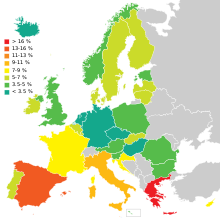saccold
meg, hány százalékos... a fordítás tán 4/5 szint is lehetne – ha a mondat második
felébe beletörik a bicskád, akkor igen, tényleg nehezebb :(
segítség a nyelvtanhoz:
* kiemelés a mondatban_mondatok
Wikipedia:
The unemployment rate is a measure of the prevalence of unemployment
and it is calculated as a percentage by dividing the number of
unemployed individuals by all individuals currently in the labor
force. During periods of recession, an economy usually experiences a
relatively high unemployment rate. According to International Labour
Organization report, more than 200 million people globally or 6% of
the world's workforce were without a job in 2012.
Eurostat,
the statistical office of the European Union, defines unemployed as
those persons age 15 to 74 who are not working, have looked for work
in the last four weeks, and ready to start work within two weeks,
which conform to ILO standards. Both the actual count and rate of
unemployment are reported. Statistical data are available by member
state, for the European Union as a whole (EU28) as well as for the
euro area (EA19). Eurostat also includes a long-term unemployment
rate. This is defined as part of the unemployed who have been
unemployed for an excess of 1 year...
...Unemployed
individuals are unable to earn money to meet financial obligations.
Failure to pay mortgage payments or to pay rent may lead to
homelessness through foreclosure or eviction...
...Unemployment
increases susceptibility to cardiovascular disease, somatization,
anxiety disorders, depression, and suicide. In addition, unemployed
people have higher rates of medication use, poor diet, physician
visits, tobacco smoking, alcoholic beverage consumption, drug use,
and lower rates of exercise...
...Another personal cost of
unemployment is its impact on relationships. A 2008 study from
Covizzi, which examines the relationship between unemployment and
divorce, found that the rate of divorce is greater for couples when
one partner is unemployed. However, a more recent study has found
that some couples often stick together in “unhappy” or
“unhealthy” marriages when unemployed to buffer financial costs.
A 2014 study by Van der Meer found that the stigma that comes from
being unemployed affects personal well-being, especially for men, who
often feel as though their masculine identities are threatened by
unemployment...
The
main source used is the European Union Labour Force Survey (EU-LFS).
The EU-LFS collects data on all member states each quarter. For
monthly calculations, national surveys or national registers from
employment offices are used in conjunction with quarterly EU-LFS
data. The exact calculation for individual countries, resulting in
harmonized monthly data, depend on the availability of the data.



